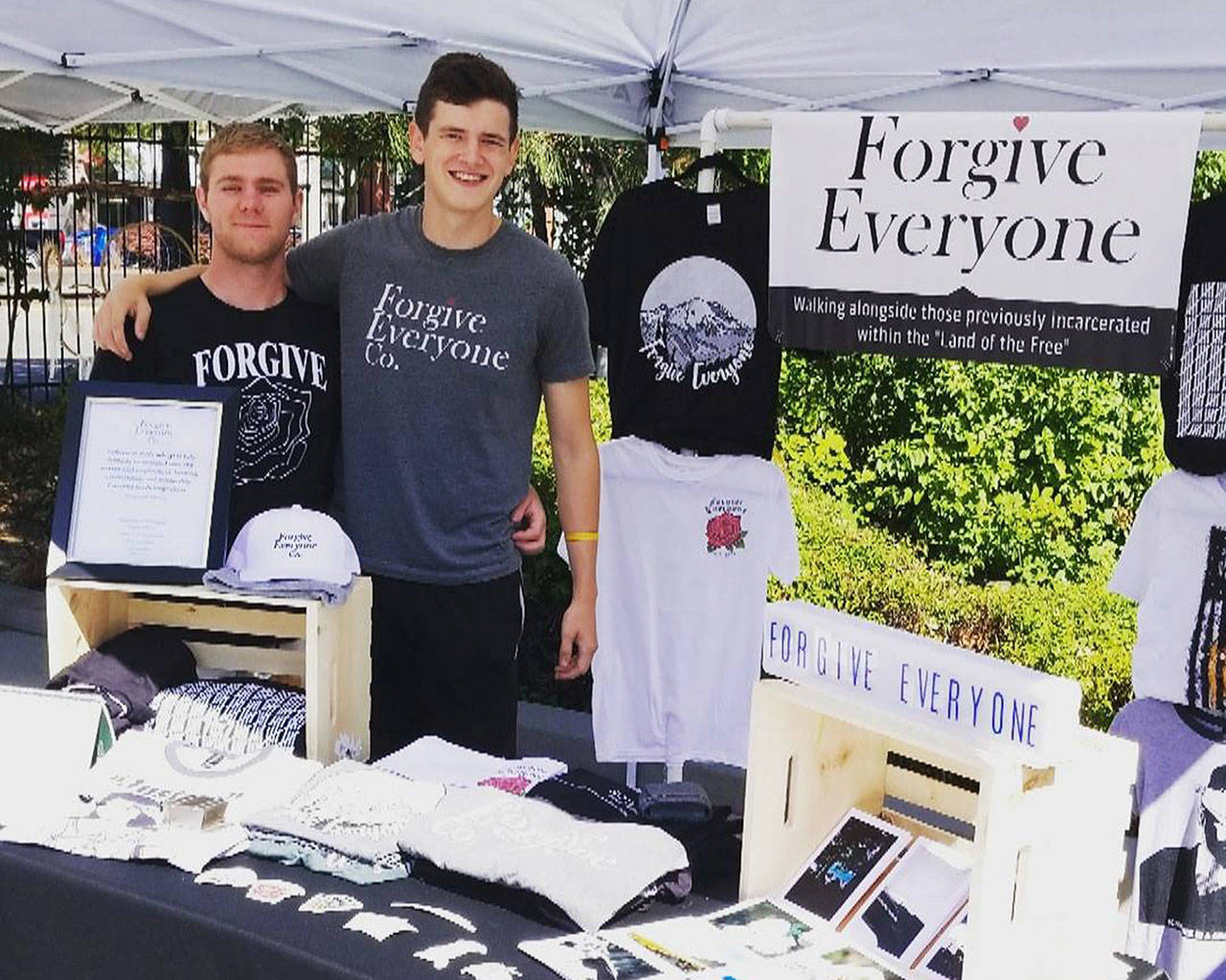Every year, approximately 9 million people are released from jail.
But according to a 2014 Bureau of Justice Statistics study, up to 75 percent are arrested and sent back into the system within five years.
That’s unacceptable, said Bonney Lake native Skyler “Sky” Rich, so he formed his own company to help change that.
The goal of Forgive Everyone Co., founded May 2018 while Rich continues his education at Calvin College, Michigan, is to aid ex-convicts — or as he prefers, “returning citizens” or “second-chance citizens” — re-integrate into society.
“I believe if someone really wants to change, they genuinely want to change their life around and put it forward, nothing should stand in their way of doing that,” he said, but added that’s not the reality most returning citizens face.
The two main reasons Rich believes the recidivism rate (the rate of people returning to prison) is so high is because of a lack of housing and employment options.
“If you think of someone coming out, and they’re not able to get a job because of their record, and they’re not able to apply for rent or housing because of their record, then they end up homeless and having to turn to other means to make a living,” Rich said.
A 2014 Arizona State University three-year long study showed when employers are sent two identical résumés, with the only difference being one checked the “committed a felony” box and the other didn’t, revealed a number of biases against those with criminal records, especially minorities.
A New York Times/CBS/Kaiser Family Foundation poll found men with criminal records “account for about 34 percent of all non-working men ages 25 to 54,” one article stated.
And according to the National Reentry Resource Center, managed by the Department of Justice, about 10 percent of those entering prison were homeless before being jailed, and about that same percentage were homeless “for some period of time” after leaving the system.
Housing and employment difficulties are just two items on a long list of what’s known as “collateral consequences,” or the “statutory and regulatory penalties, sanctions and restrictions” the U.S. places on people convicted of a crime, according to the Federal Interagency Reentry Council 2016 report, which also stated the American Board Association identified 46,000 various collateral consequences on the state and federal level.
These consequences include banning sex offenders from having an occupation or living in an area around kids, but also spans to a 13-state ban on anyone convicted of a drug-related crime from receiving any public assistance from the Temporary Assistance to Needy Families program (and another 23 states have a partial ban).
“Collateral consequences also include the less formal, but equally powerful, social stigma and negative societal attitudes that are associated with having a criminal record, even when it did not result in a conviction,” the report reads.
That social stigma is why Rich works hard to re-label people who leave prison, in the hope that people can start seeing past the crime returning citizens committed.
“That terminology, felon or ex-convict, reduces a person down to their record,” he said. “They’re not just a felon, just a drug dealer or a murderer or an ex-con — they’re a person who has a full experience in life, and they happened to experience incarceration through decisions that they made.
“Often times, the only thing that separates us from them is, we didn’t caught, when it comes down to some experiences in life,” Rich continued.
Looking for artists
Through Forgive Everyone Co., Rich donates around 50 percent of the money made by selling various apparel to organizations that support returning citizen integration, like What’s Next Washington and House of Mercy, a faith-based transitional housing development based in Federal Way.
But his big goal is to find returning citizens with artistic skills to design his apparel as a way to financially support themselves, even if just a little.
“Right now, the majority are designed by myself, and I have a couple of designs out there that are designed by formerly incarcerated artists,” Rich said. “One of the main ones is Henry — he was incarcerated at the age of 20 when he was sill in college for graphic design. When he got out, they wouldn’t let him back in to college because of his record, so now he’s working as a cook in Michigan, but he’s doing designs on the sides for me.”
But getting people to even just talk publicly about their experiences with incarceration and re-integration for his blog is difficult, let alone get lucky enough to also find people who have artistic skills.
“They put themselves in a vulnerable place, sharing their story with me. I try to be really careful, navigating that,” Rich said. “It’s a really difficult thing for them to re-live.”
While Henry is helping Rich out with some designs, visitors to the Forgive Everyone Co. website will quickly notice one design being heavily repeated: a rose, which was designed by Rich.
“The rose represents, traditionally, new beginnings and new beauty, but the thorns represent the thorny past — putting the past behind you and coming out into new beauty and a new beginning,” Rich said.
Rich said he’s considered making his company a non-profit, but at the moment, any money he doesn’t donate to other non-profits or goes toward his artists’ commission goes right back into the company anyway, and he doesn’t see a profit.
Rich can be contacted through his website, www.forgiveeveryoneco.com, or by emailing him at forgiveeveryoneco@outlook.com.


